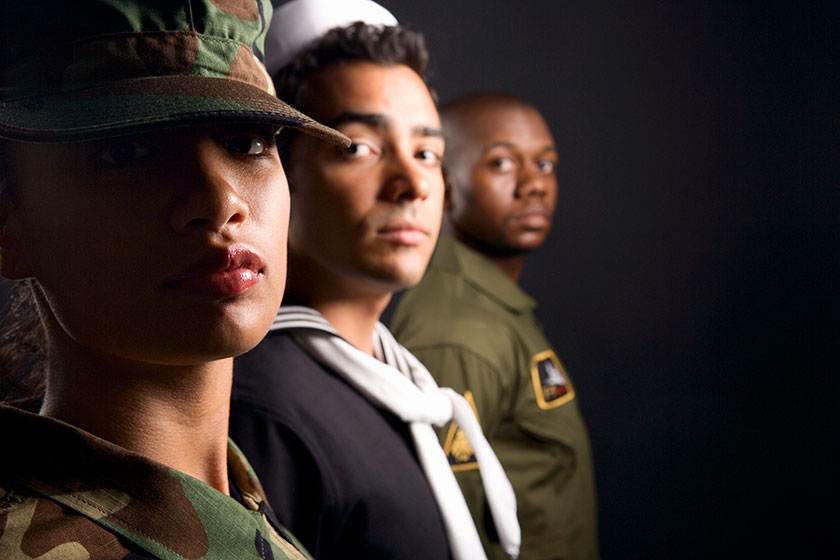
America is the "land of the free," but many of those who served our country are now serving time. The Bureau of Justice Statistics estimates that there are about 180,000 United States veterans in our prisons and jails.
This past Sunday, November 11, our country celebrated Veterans Day, a celebration to honor America's service members for their patriotism, love of country, and willingness to serve and sacrifice for the common good. Yet let's not overlook the thousands of incarcerated veterans who served our country. A good place to start is understanding why some end up in prison.
WHY VETERANS GO TO PRISON
About half of incarcerated veterans have a mental health disorder, according to the Bureau of Justice Statistics. A study on veterans' perspectives on the pathways to criminal justice involvement found that though substance abuse is common among those in prison, veterans reported that their substance use stemmed from after effects from their time in the military (such as post-traumatic stress disorder, or PTSD), difficulty adjusting to civilian life, and relational stress with friends and family.
Some veterans interviewed for the study cited homelessness or their inability to pay bills as reasons for their involvement in the justice system. Their financial hardships were brought on or exacerbated by an inability to manage their finances and difficulties adjusting to differences in pay and lifestyle.
Other veterans cited difficulties with returning to civilian life, particularly among those who struggled to find work and have trouble coping with the loss of military-style structure and accountability. Some veterans turn to unhealthy solutions or illegal actions. This has contributed to a large population of veterans behind bars, including many who served in the extended global conflicts of the last two decades.
INNOVATED SOLUTIONS TO VETERANS' INCARCERATION
To meet the needs of veterans who get in trouble with the law, there are now more than 200 Veterans Treatment Courts (VTCs) designed to give veterans alternatives to the criminal justice system when appropriate, particularly when a veteran suffers from PTSD or other mental health issues. VTCs are modeled after drug courts, which have proved successful in leading people struggling with addiction out of the justice system and into healthy lives of recovery. In September, President Donald Trump signed into law an expansion of the Veterans Justice Outreach program to put more specialists into American courtrooms to help work with veterans facing legal troubles.
Some prisons and jails, like the Albany County Jail in upstate New York, have created veterans-only cell blocks, featuring transformative programming like group substance abuse treatment, one-on-one therapy, group discussions, and planning for the return home. The approach is seeing positive results in reducing recidivism and creating safer prison environments.
According to one NBC News story, Kyle Weber, a 27-year-old living in the veterans' bloc inside Albany County Jail, said, "I never thought I'd quit smoking weed. I never thought I'd stop drinking. I never thought I would own the fact that I chose all of those over my family. It's the best worst thing that's ever happened to me."
Other correctional facilities are taking a furrier approach. Both the New York and Michigan Departments of Correction (DOC) offer dog-training programs for service dogs that go on to help wounded veterans. Puppies Behind Bars is one New York-based nonprofit that partners with the DOC there to provide the program. "[Puppies Behind Bars] incentivizes good behavior in the facility as well as [gives] individuals the opportunity to do something positive for someone else, while learning patience, pride, and accomplishment—all of which will benefit them when they reenter society," according to one DOC official.
THE DIGNITY OF TRANSFORMATIVE PROGRAMMING
For incarcerated men and women, transformative programming is crucial to instilling them with dignity, preparing them to reenter society, and creating safer communities. At Prison Fellowship®, we believe that everyone was created with dignity and purpose—including men and women in prison. The Bible calls Christians to remember those in prison (Hebrews 13:3). To remember prisoners means to treat them with dignity by not overlooking them and by serving alongside them.
This is why we are focused on bringing the Prison Fellowship Academy® to prisons across America. The Prison Fellowship Academy is an intensive, biblically based program that takes incarcerated men and women through a holistic life transformation process, so they can lead lives of purpose and productivity inside and outside of prison.
As we remember our nation's service members, let's also remember our nation's incarcerated veterans, who defended our country's freedom and are made in the image of God. They may deserve to be incarcerated, but they also deserve to be treated with dignity.
OTHER STORIES YOU MIGHT LIKE
AN UNFORGETTABLE STORY OF ONE JUDGE’S COMPASSION FOR AN EMBATTLED VETERAN
All it took was having someone there—someone who saw him, not for what he did, but for who he was.
Even behind bars, you can be your own best advocate. Your mindset is the single greatest factor in whether you do your time or use your time.
DID YOU ENJOY THIS ARTICLE?
Make sure you don' t miss out on any of our helpful articles and incredible transformation stories! Sign up to receive our weekly newsletter, and you' ll get great content delivered directly to your inbox.
Your privacy is safe with us. We will never sell, trade, or share your personal information.